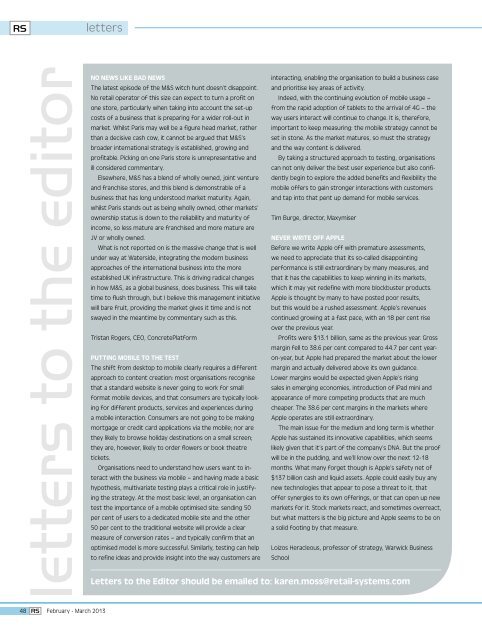You also want an ePaper? Increase the reach of your titles
YUMPU automatically turns print PDFs into web optimized ePapers that Google loves.
RS<br />
letters to the editor<br />
letters<br />
48 RS February - March 2013<br />
NO NEWS LIKE BAD NEWS<br />
The latest episode of the M&S witch hunt doesn’t disappoint.<br />
No retail operator of this size can expect to turn a profit on<br />
one store, particularly when taking into account the set-up<br />
costs of a business that is preparing for a wider roll-out in<br />
market. Whilst Paris may well be a figure head market, rather<br />
than a decisive cash cow, it cannot be argued that M&S’s<br />
broader international strategy is established, growing and<br />
profitable. Picking on one Paris store is unrepresentative and<br />
ill considered commentary.<br />
Elsewhere, M&S has a blend of wholly owned, joint venture<br />
and franchise stores, and this blend is demonstrable of a<br />
business that has long understood market maturity. Again,<br />
whilst Paris stands out as being wholly owned, other markets’<br />
ownership status is down to the reliability and maturity of<br />
income, so less mature are franchised and more mature are<br />
JV or wholly owned.<br />
What is not reported on is the massive change that is well<br />
under way at Waterside, integrating the modern business<br />
approaches of the international business into the more<br />
established UK infrastructure. This is driving radical changes<br />
in how M&S, as a global business, does business. This will take<br />
time to flush through, but I believe this management initiative<br />
will bare fruit, providing the market gives it time and is not<br />
swayed in the meantime by commentary such as this.<br />
Tristan Rogers, CEO, ConcretePlatform<br />
PUTTING MOBILE TO THE TEST<br />
The shift from desktop to mobile clearly requires a different<br />
approach to content creation: most organisations recognise<br />
that a standard website is never going to work for small<br />
format mobile devices, and that consumers are typically looking<br />
for different products, services and experiences during<br />
a mobile interaction. Consumers are not going to be making<br />
mortgage or credit card applications via the mobile; nor are<br />
they likely to browse holiday destinations on a small screen;<br />
they are, however, likely to order flowers or book theatre<br />
tickets.<br />
Organisations need to understand how users want to interact<br />
with the business via mobile – and having made a basic<br />
hypothesis, multivariate testing plays a critical role in justifying<br />
the strategy. At the most basic level, an organisation can<br />
test the importance of a mobile optimised site: sending 50<br />
per cent of users to a dedicated mobile site and the other<br />
50 per cent to the traditional website will provide a clear<br />
measure of conversion rates – and typically confirm that an<br />
optimised model is more successful. Similarly, testing can help<br />
to refine ideas and provide insight into the way customers are<br />
interacting, enabling the organisation to build a business case<br />
and prioritise key areas of activity.<br />
Indeed, with the continuing evolution of mobile usage –<br />
from the rapid adoption of tablets to the arrival of 4G – the<br />
way users interact will continue to change. It is, therefore,<br />
important to keep measuring: the mobile strategy cannot be<br />
set in stone. As the market matures, so must the strategy<br />
and the way content is delivered.<br />
By taking a structured approach to testing, organisations<br />
can not only deliver the best user experience but also confidently<br />
begin to explore the added benefits and flexibility the<br />
mobile offers to gain stronger interactions with customers<br />
and tap into that pent up demand for mobile services.<br />
Tim Burge, director, Maxymiser<br />
NEVER WRITE OFF APPLE<br />
Before we write Apple off with premature assessments,<br />
we need to appreciate that its so-called disappointing<br />
performance is still extraordinary by many measures, and<br />
that it has the capabilities to keep winning in its markets,<br />
which it may yet redefine with more blockbuster products.<br />
Apple is thought by many to have posted poor results,<br />
but this would be a rushed assessment. Apple’s revenues<br />
continued growing at a fast pace, with an 18 per cent rise<br />
over the previous year.<br />
Profits were $13.1 billion, same as the previous year. Gross<br />
margin fell to 38.6 per cent compared to 44.7 per cent yearon-year,<br />
but Apple had prepared the market about the lower<br />
margin and actually delivered above its own guidance.<br />
Lower margins would be expected given Apple’s rising<br />
sales in emerging economies, introduction of iPad mini and<br />
appearance of more competing products that are much<br />
cheaper. The 38.6 per cent margins in the markets where<br />
Apple operates are still extraordinary.<br />
The main issue for the medium and long term is whether<br />
Apple has sustained its innovative capabilities, which seems<br />
likely given that it’s part of the company’s DNA. But the proof<br />
will be in the pudding, and we’ll know over the next 12-18<br />
months. What many forget though is Apple’s safety net of<br />
$137 billion cash and liquid assets. Apple could easily buy any<br />
new technologies that appear to pose a threat to it, that<br />
offer synergies to its own offerings, or that can open up new<br />
markets for it. Stock markets react, and sometimes overreact,<br />
but what matters is the big picture and Apple seems to be on<br />
a solid footing by that measure.<br />
Loizos Heracleous, professor of strategy, Warwick Business<br />
School<br />
Letters to the Editor should be emailed to: karen.moss@retail-systems.com


